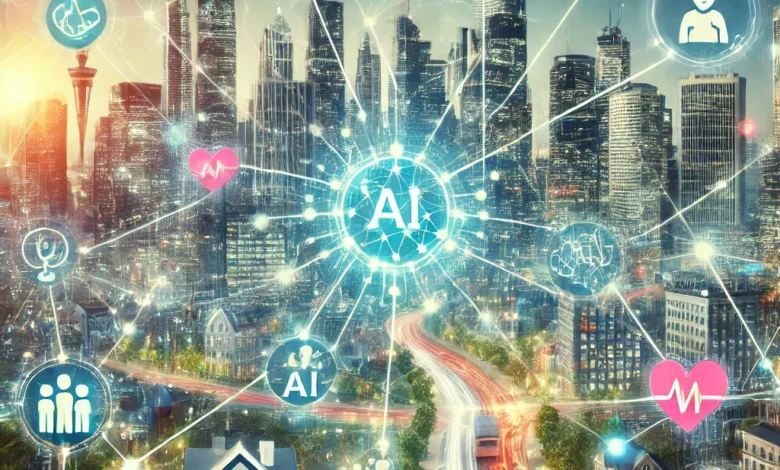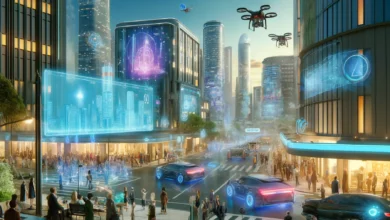Unlocking the Future: The Transformative Power of AI in Everyday Life

Introduction
Artificial Intelligence (AI) is no longer a concept of the distant future; it’s a powerful force shaping our present. What was once limited to science fiction has now become an integral part of our daily lives, revolutionizing industries, enhancing personal productivity, and even changing how we interact with the world. The rise of AI is not just a technological trend; it’s a transformative movement that holds the potential to unlock unprecedented opportunities for individuals and societies alike.
In this blog, we will explore the various ways AI is positively impacting our lives. From enhancing healthcare and education to streamlining business operations and creating more personalized experiences, AI is paving the way for a more efficient, innovative, and connected world. Let’s dive into the myriad ways AI is making a difference today and what it means for the future.
AI in Healthcare: A Revolution in Patient Care
Healthcare is one of the most promising fields for AI applications. The integration of AI in healthcare is not only improving patient outcomes but also making healthcare more accessible and efficient.
- Early Diagnosis and Predictive AnalyticsAI algorithms are being used to analyze vast amounts of medical data, helping doctors detect diseases at their earliest stages. For example, AI-powered imaging tools can identify patterns in medical scans that may be missed by the human eye, allowing for earlier diagnosis of conditions like cancer or heart disease. Moreover, predictive analytics can assess a patient’s risk of developing certain conditions based on their medical history, lifestyle, and genetic factors, enabling preventive measures to be taken.
- Personalized Treatment PlansAI is also instrumental in developing personalized treatment plans. By analyzing a patient’s genetic makeup and other individual factors, AI can recommend treatments that are most likely to be effective for that specific patient. This level of personalization ensures better outcomes and reduces the trial-and-error approach often associated with traditional treatments.
- Robotic SurgeryRobotic surgery, guided by AI, allows for greater precision, smaller incisions, and faster recovery times. Surgeons can perform complex procedures with the assistance of AI-powered robots that offer enhanced dexterity and accuracy, leading to improved patient outcomes.
Visit https://i5m.pl/
AI in Education: Personalizing Learning Experiences
The education sector is undergoing a significant transformation with the advent of AI. By tailoring learning experiences to individual needs, AI is making education more accessible, engaging, and effective.
- Adaptive Learning SystemsAI-driven adaptive learning systems can assess a student’s strengths and weaknesses in real-time, adjusting the curriculum to match their learning pace and style. This personalized approach ensures that students receive the support they need to succeed, making education more inclusive and effective.
- Virtual Tutors and AssistantsAI-powered virtual tutors are available 24/7 to assist students with their studies. These tutors can provide instant feedback, answer questions, and offer additional resources, helping students to learn independently and at their own pace. AI assistants also help teachers manage administrative tasks, allowing them to focus more on teaching.
- Enhancing AccessibilityAI is making education more accessible for students with disabilities. Speech recognition software, AI-driven translation tools, and other assistive technologies are breaking down barriers, ensuring that every student has the opportunity to learn.
AI in Business: Driving Efficiency and Innovation
In the business world, AI is a game-changer. It’s not just about automating tasks; it’s about driving innovation, improving decision-making, and creating new opportunities for growth.
- Automation of Routine TasksAI is automating routine tasks, freeing up employees to focus on more strategic and creative aspects of their jobs. From managing emails to processing invoices, AI handles repetitive tasks with speed and accuracy, leading to increased efficiency and productivity.
- Data-Driven Decision MakingAI is enabling businesses to make smarter decisions by analyzing vast amounts of data. AI-powered analytics can uncover patterns and insights that humans might miss, helping businesses predict trends, understand customer behavior, and optimize their operations.
- Enhancing Customer ExperienceAI is also transforming the way businesses interact with their customers. AI-powered chatbots and virtual assistants provide instant, personalized responses to customer inquiries, improving customer satisfaction. Additionally, AI can analyze customer data to offer personalized product recommendations, creating a more tailored shopping experience.
AI in Everyday Life: Making Life More Convenient
AI is not just transforming industries; it’s also making our everyday lives more convenient and enjoyable.
- Smart HomesAI is at the heart of smart home technology, making our living spaces more comfortable, efficient, and secure. From voice-activated assistants that control your home environment to AI-powered security systems that monitor your property, AI is enhancing the way we live.
- Personal AssistantsAI-powered personal assistants are becoming increasingly sophisticated, helping us manage our schedules, set reminders, and even order groceries. These assistants learn from our habits and preferences, providing a level of convenience that was unimaginable just a few years ago.
- EntertainmentAI is also revolutionizing the entertainment industry. Streaming services use AI algorithms to recommend movies, shows, and music based on our preferences, creating a more personalized entertainment experience. Additionally, AI is being used in the creation of content, from writing scripts to composing music, opening up new possibilities in creative fields.
The Future of AI: Ethical Considerations and Opportunities
As AI continues to evolve, it’s important to consider the ethical implications and ensure that the technology is developed and used responsibly.
- Ethical AI DevelopmentThe development of AI should be guided by ethical principles that prioritize fairness, transparency, and accountability. This includes ensuring that AI systems do not perpetuate biases or make decisions that could harm individuals or communities.
- Job Transformation and CreationWhile AI is automating certain tasks, it’s also creating new jobs and opportunities. The key is to focus on reskilling and upskilling the workforce to take on roles that require human creativity, problem-solving, and emotional intelligence—skills that AI cannot replicate.
- AI for Social GoodAI has the potential to address some of the world’s most pressing challenges, from climate change to poverty. For example, AI can be used to optimize energy consumption, monitor environmental changes, and develop solutions for sustainable agriculture. By focusing on AI for social good, we can harness the power of technology to create a better future for all.
Conclusion: Embracing the AI-Driven Future
The impact of AI on our lives is profound and far-reaching. From healthcare and education to business and everyday life, AI is driving positive change and opening up new possibilities. As we move forward, it’s crucial to embrace this technology with a focus on ethical development and responsible use.
The future of AI is bright, and its potential is limitless. By understanding and leveraging the power of AI, we can create a world that is not only more efficient and innovative but also more equitable and sustainable. The journey of AI has just begun, and the possibilities are endless. Let’s embrace this exciting future with optimism and a commitment to making the world a better place through the power of AI.


